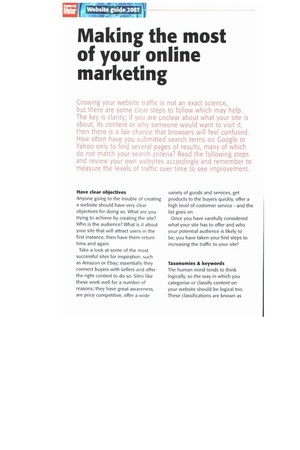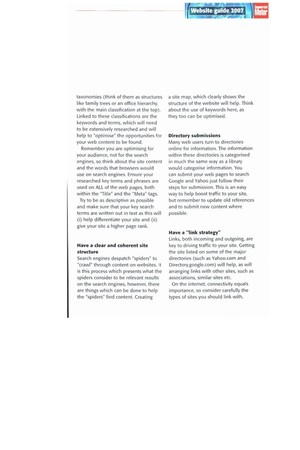Making the most of your online marketing
Page 148

Page 149

If you've noticed an error in this article please click here to report it so we can fix it.
Growing your website traffic is not an exact science, but there are some clear steps to follow which may help. The key is clarity; if you are unclear about what your site is about, its content or why someone would want to visit it, then there is a fair chance that browsers will feel confused. How often have you submitted search terms on Google or Yahoo only to find several pages of results, many of which do not match your search criteria? Read the following steps and review your own websites accordingly and remember to measure the levels of traffic over time to see improvement.
Have clear objectives Anyone going to the trouble of creating a website should have very clear objectives for doing so. What are you trying to achieve by creating the site? Who is the audience? What is it about your site that will attract users in the first instance, then have them return time and again.
Take a look at some of the most successful sites for inspiration, such as Amazon or Ebay; essentially they connect buyers with sellers and offer the right content to do so. Sites like these work well for a number of reasons: they have great awareness, are price competitive, offer a wide variety of goods and services, get products to the buyers quickly, offer a high level of customer service and the list goes on.
Once you have carefully considered what your site has to offer and who your potential audience is likely to be, you have taken your first steps to increasing the traffic to your site!
Taxonomies & keywords The human mind tends to think logically, so the way in which you categorise or classify content on your website should be logical too. These classifications are known as taxonomies (think of them as structures like family trees or an office hierarchy, with the main classification at the top). Linked to these classifications are the keywords and terms, which will need to be extensively researched and will help to "optimise" the opportunities for your web content to be found.
Remember you are optimising for your audience, not for the search engines, so think about the site content and the words that browsers would use on search engines. Ensure your researched key terms and phrases are used on ALL of the web pages, both within the "Title" and the "Meta" tags.
Try to be as descriptive as possible and make sure that your key search terms are written out in text as this will (i) help differentiate your site and (ii) give your site a higher page rank.
Have a clear and coherent site structure Search engines despatch "spiders" to "crawl" through content on websites. It is this process which presents what the spiders consider to be relevant results on the search engines, however, there are things which can be done to help the "spiders" find content. Creating a site map, which clearly shows the structure of the website will help. Think about the use of keywords here, as they too can be optimised.
Directory submissions Many web users turn to directories online for information. The information within these directories is categorised in much the same way as a library would categorise information. You can submit your web pages to search Google and Yahoo just follow their steps for submission. This is an easy way to help boost traffic to your site, but remember to update old references and to submit new content where possible.
Have a "link strategy'
Links, both incoming and outgoing, are key to driving traffic to your site. Getting the site listed on some of the major directories (such as Yahoo.com and Directory.google.com) will help, as will arranging links with other sites, such as associations, similar sites etc.
On the internet, connectivity equals importance, so consider carefully the types of sites you should link with.




































































































































































































































